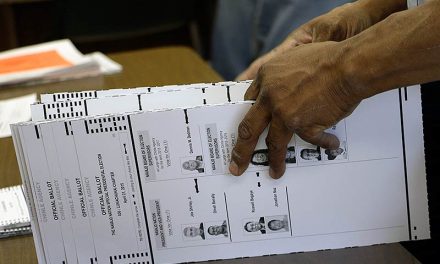
Navajo Nation advocates for urgent water rights legislation in Washington
WINDOW ROCK — In a critical push for water rights legislation, Navajo Nation President Buu Nygren and Crystalyne Curley have been actively advocating in Washington, D.C., emphasizing the urgency of securing essential funding and support for tribal water projects.
Speaking after a series of meetings with lawmakers, Nygren expressed optimism about the bipartisan efforts surrounding this legislation despite the pressing timeline facing the Navajo Nation.
“Today was very good because we scheduled it to make sure that we continue to reconnect with our allies,” Nygren stated. He highlighted a productive meeting with U.S. Sen. Mark Kelly, who is working to rally additional support among Senate leaders. “We don’t want this to go into the next administration, even though this is bipartisan. We’ve got Republican and Democratic support, so we just don’t want to restart the process,” he added.
Nygren stressed the importance of several key initiatives, particularly the Navajo-Gallup Water Supply Project, which he flagged as critical. “That one needs to happen now because if that doesn’t happen, construction could stop next year. That’s very critical to be out here to make sure that we advocate for that,” he warned. He noted that delaying action on these initiatives could lead to significant setbacks, potentially stalling the project for a decade or more.
Water rights at stake
With approximately $6 billion in water rights at stake, Nygren emphasized the urgency of the situation.
The NAIWRSA was approved on May 24, paving the way for comprehensive water rights recognition not only for the Navajo Nation but also for the Hopi Tribe and the San Juan Southern Paiute Tribe.
The settlement involves a coalition of key stakeholders, including the U.S. government, the state of Arizona, various cities, and utility companies, all aiming to enhance water delivery systems and infrastructure crucial for tribal communities. The legislation was brought to Congress through Senate Bill 4633, introduced by U.S. Sens. Mark Kelly and Kyrsten Sinema, alongside its House counterpart, H.R. 8940, introduced by Reps. Eli Crane, Greg Stanton, Juan Ciscomani, David Schweikert, and Ruben Gallego.
Under NAIWRSA, the Navajo Nation’s water rights have been confirmed to include an impressive allocation of 44,700 acre-feet per year, or AFY, from the Upper Basin Colorado River and 3,600 AFY from the Lower Basin.
Additionally, the settlement recognizes all Lower Colorado River water reaching the Navajo Reservation, with historic flows estimated at around 122,000 AFY. The agreement establishes limits on pumping from local aquifers, ensuring sustainable water use and management if approved.
One of the cornerstone components of the settlement is the provision of $5 billion for the development of water delivery infrastructure, predominantly within the Navajo Nation. This funding will facilitate the construction of the iiná bá – paa tuwaqat’si pipeline, designed to transport Colorado River water from Lake Powell to various communities across the reservation, including Tuba City and Cameron. The plan addresses critical supply needs in areas where over 30% of households lack running water, relying instead on hauling supplies from distant sources.
In addition to the funds earmarked for the Navajo Nation, the Hopi Tribe will receive $508.5 million, while the San Juan Southern Paiute Tribe will benefit from $29.8 million to support their water-related projects. The establishment of a Navajo Nation Water Settlement Trust Fund worth more than $2.7 billion aims to further enhance water access and support agricultural activities across Navajo communities.
Objections from neighboring states
The legislation also opens avenues for inter-basin leasing, allowing the Navajo and Hopi tribes to lease their Upper Basin Colorado River water in the Lower Colorado River Basin. This provision not only empowers the tribes financially but also provides critical flexibility in water management, especially amid ongoing challenges posed by drought and water shortages in the region.
However, the settlement has prompted objections from neighboring states, particularly Colorado and Wyoming, due to concerns over the potential precedent set by allowing the Navajo Nation to lease its water from the Upper Basin to the Lower Basin. Meanwhile, New Mexico has expressed apprehension over the diversion of its water resources into Arizona for Navajo use, although resolutions to these concerns have been reached.
According to President Nygren, the Department of the Interior is actively supporting the initiative and has contributed to discussions aimed at addressing cost overruns associated with water infrastructure projects. Recent meetings between representatives from seven basin states have taken place to resolve outstanding concerns and ensure a cohesive implementation of the settlement.
“We’ve got a lot on the line when it comes to Navajo. There’s just so much that we have to do in a short amount of time,” President Nygren said.
He elaborated on the timeline, indicating that the window for action is rapidly closing as Congress prepares for its holiday recess.
“We’re in the fourth quarter. If we want to see a lot of these water rights bills done, it’s going to come down to the wire,” he explained.
Strong support for water issues
At the heart of President Nygren’s advocacy are discussions he said he held with various congressional members, including Congressman Eli Crane and U.S. Rep. Teresa Leger Fernández, both of whom have shown strong support for water rights issues. Nygren noted that their backing is essential as the Navajo Nation seeks to navigate the legislative process efficiently.
“As we move forward, our focus remains on ensuring that these vital water rights bills cross the finish line in the coming weeks,” Nygren concluded, reiterating his commitment to working tirelessly on behalf of the Navajo people.
Speaker Curley also joined key congressional officials today, Nov. 13, to discuss the ongoing negotiations surrounding the Northeastern Arizona Indian Water Rights Settlement. The meetings included Sen. Kelly, U.S. Rep. Juan Ciscomani, and Congresswoman Fernandez, with a focus on advancing four critical water agreements.
“We are trying to move along all of our four deals,” said Curley. “The biggest one is the Arizona water rights settlement, but we’re also addressing the Gallup, New Mexico water supply line.” She emphasized the collaborative efforts needed to ensure progress across all fronts, ensuring that timelines remain aligned.
Curley also expressed optimism regarding the Arizona water rights settlement, despite some technical issues that require attention.
“Right now, the Rio San Jose legislation is on a good track, and the Navajo-Gallup Water Supply is moving forward as well,” she noted. “While there are some technical issues within the Arizona water rights settlement, it looks very promising that those will be resolved within the next few days.”
The anticipated resolution of these technical matters is crucial as the Navajo Nation aims for the bill to be ready for markup by the first week of December. Curley indicated that discussions with federal leaders had not raised concerns about the settlement’s dollar amount, pointing instead to the need for strategic planning around the $5 billion funding request tied to the settlement. “It’s just more about the technicalities that need to be fixed,” she explained.
A significant aspect of this settlement is the Navajo Nation’s approach to water infrastructure investment.
“We’ve been investing in our water infrastructure for many years and decades,” Curley said. “This five billion dollars will supplement and enhance existing projects, allowing us to avoid previous pitfalls while ensuring immediate project commencement.”
Speaker Curley highlighted the importance of lessons learned from past water supply agreements.
“We are learning a lot quickly from our experiences. This bill aims to prevent the issues we’ve encountered with other settlements,” she said.
As the Navajo Nation pursues the settlement, there is an emphasis on the efficient management of resources and the potential interconnection of ARPA funds to streamline water projects.
“Ultimately, once the money is appropriated, it will be managed by BOR (Bureau of Reclamation), which will handle the administrative overhead for all projects within Navajo,” Curley concluded, signaling a proactive stance on ensuring effective implementation of future water initiatives.








 Highway 264,
Highway 264, I-40, WB @ Winslow
I-40, WB @ Winslow